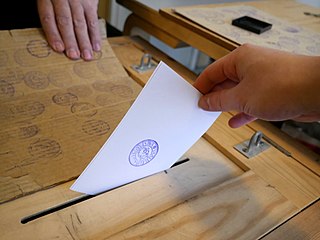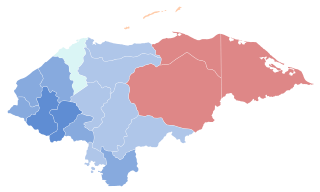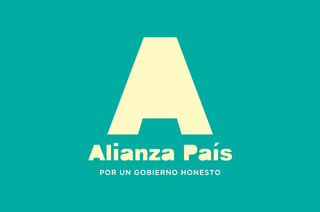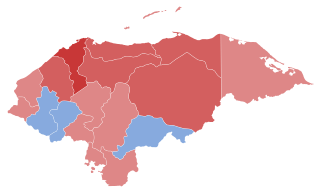
Politics of Honduras takes place in a framework of a multi-party system presidential representative democratic republic. The President of Honduras is both head of state and head of government. Executive power is exercised by the government. Legislative power is vested in the National Congress of Honduras. The party system is dominated by the conservative National Party of Honduras, the Liberal Party of Honduras, and Liberty and Refoundation.

The Dominican Republic is a representative democracy, where the President of the Dominican Republic functions as both the head of the government and head of the multi-party system. Executive power is exercised by the government. Legislative power is vested in the bicameral National Congress. The Judiciary is independent of the executive and the legislature.

Party primaries or primary elections are elections in which a political party selects a candidate for an upcoming general election. Depending on the country and administrative division, there may be an "open primary", in which all voters are eligible to participate, or a "closed primary", in which only members of a political party can vote.
An indirect election or hierarchical voting, is an election in which voters do not choose directly among candidates or parties for an office, but elect people who in turn choose candidates or parties. It is one of the oldest forms of elections and is used by many countries for heads of state, cabinets, heads of government, and/or upper houses. It is also used for some supranational legislatures.

A presidential election is the election of any head of state whose official title is President.

Elections in Chile are held nationwide, including the presidency, parliament, regional offices, and municipal positions. Chilean citizens and foreign residents with legal residency of at least five years, who are 18 years or older on election day, are eligible to vote. Previously, voting was voluntary, but since 2023, it has become compulsory.

In the politics of the United States, elections are held for government officials at the federal, state, and local levels. At the federal level, the nation's head of state, the president, is elected indirectly by the people of each state, through an Electoral College. Today, these electors almost always vote with the popular vote of their state. All members of the federal legislature, the Congress, are directly elected by the people of each state. There are many elected offices at state level, each state having at least an elective governor and legislature. There are also elected offices at the local level, in counties, cities, towns, townships, boroughs, and villages; as well as for special districts and school districts which may transcend county and municipal boundaries.
Elections in the People's Republic of China occur under a one-party authoritarian political system controlled by the Chinese Communist Party (CCP). Direct elections, except in the special administrative regions of Hong Kong and Macau, occur only at the local level people's congresses and village committees, with all candidate nominations preapproved by the CCP. By law, all elections at all levels must adhere to the leadership of the CCP.

Honduras National Congress has 128 members (diputados); they serve four-year terms.

Elections in Nigeria involve choosing representatives for the federal government of Nigeria as well as the various states in the Fourth Nigerian Republic. Elections in Nigeria began in 1959 with several political parties. It's a method of choosing leaders for which the citizens have the right to vote and to be voted for. In 2023, Nigerians were getting ready for presidential elections with about 93.4 million eligible voters across the federation.

Elections in California are held to fill various local, state and federal seats. In California, regular elections are held every even year ; however, some seats have terms of office that are longer than two years, so not every seat is on the ballot in every election. Special elections may be held to fill vacancies at other points in time. Recall elections can also be held. Additionally, statewide initiatives, legislative referrals and referendums may be on the ballot.

General elections were held in Honduras to elect the President of Honduras, vice-president, and deputies to the National Congress of Honduras on 27 November 2005. For the 2005 election the constitution was amended to create a single vice-president. For the 2005 election the system of proportional representation was also changed from a closed list to an open list — the parties also used open-list primaries to select candidate slates. The list system reduced the re-election rate of incumbents, with just 31% of deputies in the new Congress having seats in the 2002–2006 Congress.

The election of the president and the vice president of the United States is an indirect election in which citizens of the United States who are registered to vote in one of the fifty U.S. states or in Washington, D.C., cast ballots not directly for those offices, but instead for members of the Electoral College. These electors then cast direct votes, known as electoral votes, for president, and for vice president. The candidate who receives an absolute majority of electoral votes is then elected to that office. If no candidate receives an absolute majority of the votes for president, the House of Representatives elects the president; likewise if no one receives an absolute majority of the votes for vice president, then the Senate elects the vice president.

The president of Honduras, officially known as the President of the Republic of Honduras, is the head of state and head of government of Honduras, and the Commander-in-chief of the Armed Forces. According to the 1982 Constitution of Honduras, the Government of Honduras consists of three branches: Executive, Legislative and Judicial. The president is the head of the Executive branch, their primary duty being to "execute and enforce the Constitution, treaties and conventions, laws and other legal dispositions". The President is directly elected for a four-year term.

General elections were held in Honduras on 24 November 2013. Voters went to the polls to elect a new President, the 128 members of the National Congress, 298 Mayors and vice-mayors and their respective councilors and 20 representatives to the Central American Parliament.

Salvador Alejandro César Nasralla Salum is a Honduran industrial civil engineer, sports journalist, television presenter, businessman, and politician who served as the First Vice President of Honduras from 2022 until his resignation in 2024.

The 2016 United States presidential election in Illinois was held on Tuesday, November 8, 2016, as part of the 2016 United States presidential election in which all 50 states plus the District of Columbia participated. Illinois voters chose electors to represent them in the Electoral College via a popular vote, pitting the Republican Party's nominee, businessman Donald Trump, and running mate Indiana Governor Mike Pence against Democratic Party nominee, former Secretary of State Hillary Clinton, and her running mate Virginia Senator Tim Kaine. Illinois had 20 votes in the Electoral College.

The Country Alliance is a political party in the Dominican Republic founded in 2011 by Guillermo Moreno and other citizens.

General elections were held in Honduras on 26 November 2017. Voters went to the polls to elect the President of Honduras to serve a four-year term, as well as 128 members of the unicameral National Congress, 20 members for the Central American Parliament and mayors for the municipalities of Honduras.

General elections were held in Honduras on 28 November 2021. Among the positions being contested was the President of Honduras, head of state and head of government of Honduras, to replace Juan Orlando Hernández from the National Party. Also up for election were the 128 deputies of the National Congress, 20 deputies to the Central American Parliament, 298 mayors and 298 vice mayors, as well as 2,092 council members.

















